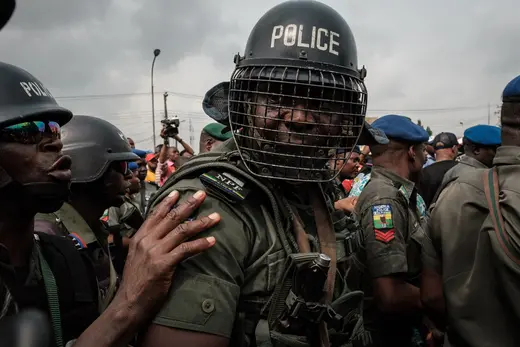Nigeria’s Slide Toward Authoritarianism
The recent unlawful detention of a journalist and politician is the latest in a series of moves by Muhammadu Buhari’s administration that weaken the rule of law.
By experts and staff
- Published
By
- John CampbellRalph Bunche Senior Fellow for Africa Policy Studies
President Muhammadu Buhari is reverting to his authoritarian style of the 1980s, growing intolerant of the press and civil society organizations that challenge his administration. Buhari’s government accuses its critics of crimes including treason and terrorism, and has undercut the judiciary. This recent authoritarian turn threatens progress made in Africa’s most populous country since the military left power in 1999.

What’s Happening
Over the past year, the military and the State Security Service (SSS)—the rough equivalent of the FBI and, during repressive periods, a secret police—have attacked or intimidated the judiciary, the media, the National Assembly, and protesters. Most notable has been the SSS’s detention of Omoyele Sowore, a prominent journalist, former presidential candidate, human rights activist, and U.S. resident who has faced repeated extrajudicial harassment since returning to Nigeria to lead a protest movement. Upon his initial release in December, SSS agents forcibly rearrested him in court while the judge fled to her chambers. Sowore was eventually released on bail, but still faces charges of treason, money laundering, and cyberstalking.
A ‘Reformed Democrat’
Buhari’s 1984–85 tenure as military chief of state sought to instill discipline among Nigerians but without respect for their individual rights. He expanded the power of state security agencies to detain people without charges and the use of capital punishment for nonviolent offenses involving narcotics. His notorious Public Officers (Protection Against False Accusation) Decree, which forbade false statements and statements intended to damage the government, led to the imprisonment of numerous journalists and activists, including musician Fela Kuti. A cybercrime bill passed in 2015, under which Sowore has been charged, is eerily similar.
After Buhari entered civilian politics, he appeared to allay concerns about his past. In a 2015 speech at London’s Chatham House, he described his ostensible conversion to democracy and the rule of law. That same year, he became the first opposition candidate to become president through the ballot box.
Despite increasing his margin of victory in 2019’s election, Buhari has seen his political position weaken. Progress against Boko Haram in the country’s northeast has stalled, conflict in the Middle Belt has spread, a crime wave has swelled, and Nigeria has more people living in extreme poverty than any other country. As criticism mounted, his administration responded with repression.
Turning Back the Clock
The Sowore episode is only the latest example of Nigeria’s authoritarian slide. A year ago, following reports of military setbacks in the fight against Boko Haram, security services stormed the offices of an influential newspaper and abducted several journalists. In 2018, masked operatives from the SSS barricaded the National Assembly building, a move opposition lawmakers claimed was meant to intimidate them. Vice President Yemi Osinbajo, who was acting president at the time, swiftly fired the SSS chief, but it remains unclear who ordered the blockade.
Contentious ethnic and religious groups have also been targeted. Ibrahim el-Zakzaky, the head of the Shiite Islamic Movement of Nigeria (IMN), has been held in government custody since late 2015, when the Nigerian army accused his followers of attempting to kill the chief of army staff and responded by killing around 350 IMN members. At least another hundred have died in subsequent crackdowns, according to Human Rights Watch. Nnamdi Kanu, the leader of the Igbo Indigenous Peoples of Biafra (IPOB), a secessionist movement, had his house raided by security services in 2017 and he fled abroad. The Buhari administration has designated both groups as terrorist organizations, though neither have committed nor threatened terrorism.
What to Expect
Some in the media are pushing back. Several large-circulation newspapers refuse to refer to Buhari as president, instead using his military rank, and refer to his government as his “regime.” They are calling for the firing of the SSS chief and others in the security services. Additionally, the Sultan of Sokoto, Nigeria’s premier Islamic traditional ruler, has publicly warned against the disobedience of court orders, in apparent reference to Sowore’s detention.
The case has also attracted international attention. Six U.S. lawmakers, including Senate Minority Leader Chuck Schumer, denounced Sowore’s unlawful incarceration on Twitter. Sowore’s wife appeared on CNN, and his arrest and release were covered by major U.S. newspapers.
However, protests are coming mainly from concerned Nigerian media and intelligentsia, who are few in number and lack significant political power. Nigeria’s poor, whom Buhari views as his support base, appear indifferent to the closing civic space. U.S. options are largely limited to diplomatic activism in support of human rights and the rule of law. Still, targeted sanctions could have an impact. Western visa restrictions on individuals involved in rights abuses, corruption, or violence could prove a starting point for change.
Jack McCaslin contributed to this piece.